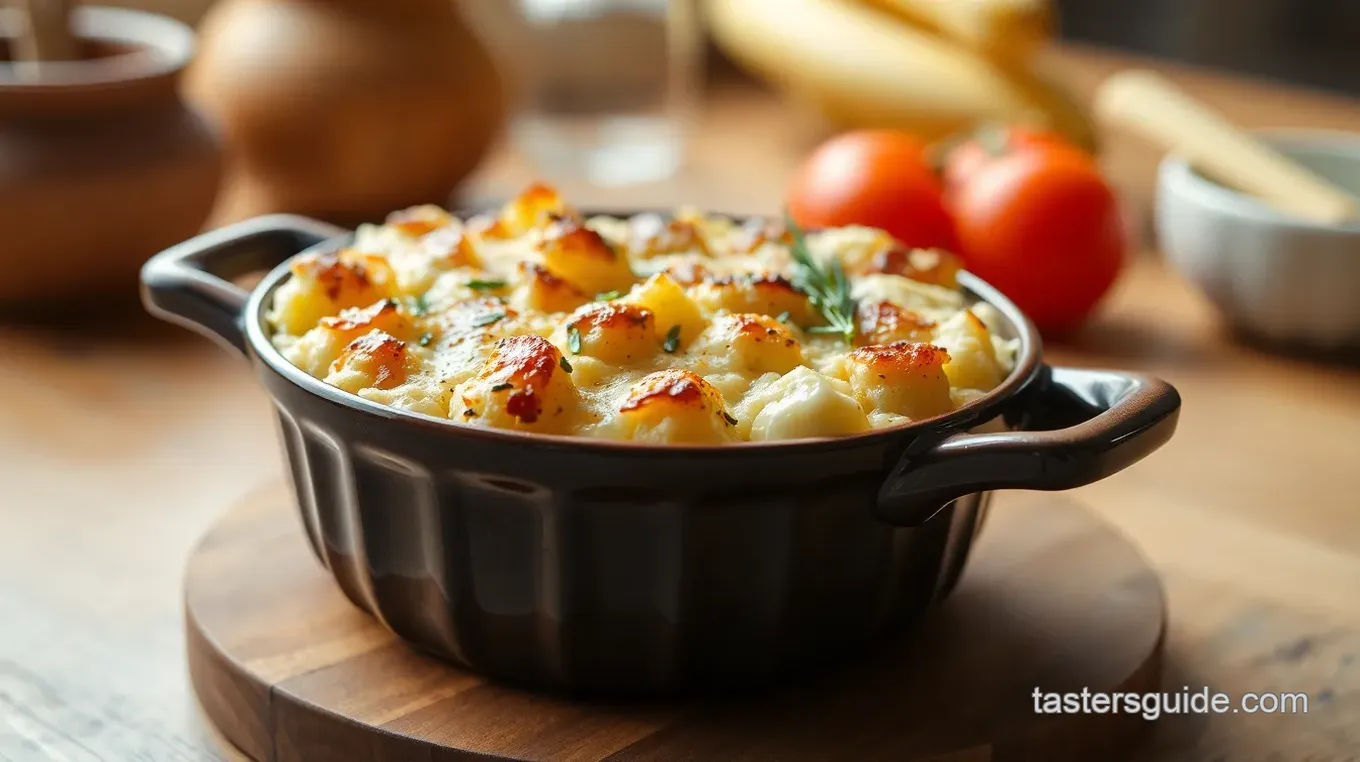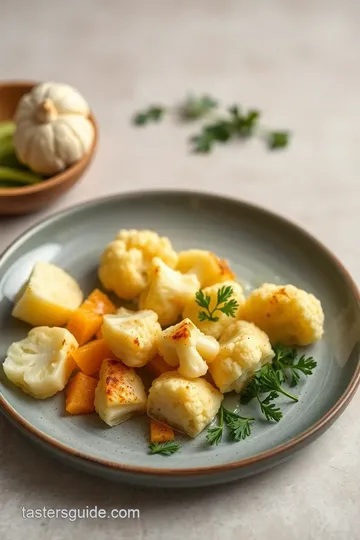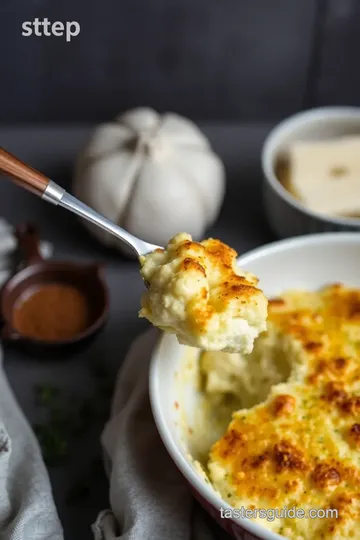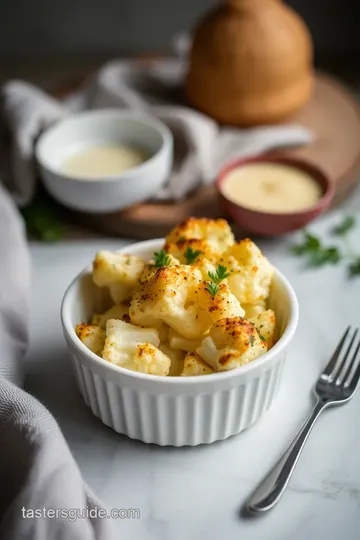Roasted Cauliflower Creamy Gratin
Looking for a comforting side dish? Try my Roasted Cauliflower Creamy Gratin | 1 Hour! It’s rich, velvety, and perfect for family dinners. Enjoy my tips!

- Finding Comfort in Roasted Cauliflower Creamy Gratin
- The Story Behind the Dish
- Why You’ll Love This Recipe
- How to Serve It Up Right
- Essential Ingredients Guide
- Unlocking the Secrets of Professional Cooking Methods for Roasted Cauliflower Creamy Gratin
- Pro Tips & Secrets
- Perfect Presentation
- Storage & Make-Ahead
- Creative Variations
- Complete Nutrition Guide
- Expert FAQ Solutions
- Recipe Card
Finding Comfort in Roasted Cauliflower Creamy Gratin
I still remember the first time i wandered into the kitchen to whip up something special. it was a chilly sunday afternoon, and all i wanted was something comforting.
You know that feeling when you crave a dish that wraps around you like a cozy blanket? that's when roasted cauliflower creamy gratin | 1 hour entered my life.
The golden, bubbling dish looked like a warm hug, and it’s no wonder it quickly became a staple at our family gatherings.
Have you ever found yourself staring at pasta or rice, thinking, "there’s got to be another way to bring warmth to the table?" well, let me tell you: this vegetarian side dish changes the game! imagine tender roasted cauliflower soaking up a creamy garlic cheese sauce, all crowned with a crunchy breadcrumb topping.
Yep, it’s as divine as it sounds, and it brings a smile to everyone's face - especially during those chilly evening meals.
The Story Behind the Dish
Cauliflower might just seem like a simple veggie, but this comforting dish has roots that go way back. folks have been using this versatile veggie in baked cauliflower recipes for ages, turning it into delightful comfort food.
Fast forward to today, and we have made it a modern meal favorite. this dish is not only easy to whip up, but it also looks so fancy, it could easily grace your table for a festive dinner.
I mean, who says you can't impress your guests with a delightful cheesy cauliflower bake while keeping the prep time to about 1 hour ?
Time-wise, we're talking about 15 minutes to prep and 30 minutes in the oven. honestly, it's approachable enough for those of us who might burn toast.
And let's not forget about the costs—this healthy gratin alternative is easy on the wallet and yields enough to feed a small army (or at least a family of four to six).
Why You’ll Love This Recipe
Let’s face it, everyone loves comfort food, right? when it gets cold outside, and you're in need of something hearty, this gratin is perfect.
It's packed with nutrition, making it a notable in the nutritious side dishes category. cauliflower is low in carbs and calories, making this low-carb cauliflower recipe a winner for those trying to watch their waistlines.
Not to mention, the combination of sharp cheddar and parmesan in the homemade cheese sauce makes it absolutely irresistible!
Imagine serving this cozy vegetarian meal at your next gathering. the rich, velvety cheese sauce combined with the subtle nuttiness of roasted cauliflower? heaven! not to mention, its breadcrumb topping gives it that extra crunch, cementing itself as the star of any plate.
It's like a gourmet side dish that’s secretly super easy to make! plus, it’s great for meal prep—just pop it in the fridge for a quick and easy dinner during the week.
How to Serve It Up Right
There’s so much you can do with this dish! it pairs wonderfully with roasted chicken, fish, or even a big salad drizzled with lemon vinaigrette.
Want to step up your game? serve it with a crisp glass of sauvignon blanc, and you’re golden. and if you want to impress those taste buds even more, feel free to toss in some sautéed mushrooms or spinach, because let's be real, who doesn't love more veggies?!
So now that we’ve warmed up to the idea of creating this heavenly dish, let’s dive into the ingredients you need to make this showstopper.
Trust me, you’ll want to keep this recipe close to your heart (and your kitchen). let’s gather up those ingredients!

Essential Ingredients Guide
Cooking is all about having fun and sharing good vibes, right? and let me tell ya, your kitchen adventures will be so much smoother when you've got the right tools and ingredients.
Today, i’m diving into my essential ingredients guide that’ll make whipping up your favorite roasted cauliflower creamy gratin | 1 hour a total breeze.
Let's get into it!
Premium Core Components
First up, we need our premium core components —aka, the key players for your dishes! whether you're keeping it classic with baked cauliflower or going wild with new flavors, the foundation is crucial.
When it comes to measurements, try to keep it straightforward:
- Cauliflower: 1 large head (about 1 kg or 2.2 lbs)
- Olive Oil: 2 tablespoons (30 ml)
- Butter: 2 tablespoons (30 g)
With every ingredient, here’s the deal—freshness matters! look for vibrant, firm cauliflower when you’re shopping. avoid any that’s wilted or discolored.
And how long can we keep these beauties? typically, fresh cauliflower will hang out in your fridge for about 5 to 7 days .
Signature Seasoning Blend
Now, let’s jazz things up with our signature seasoning blend . for a dish like a cheesy cauliflower bake , you’ll need some good quality spices.
Trust me—garlic powder, salt, and freshly ground black pepper are non-negotiables!
Herbs, too! everybody loves a touch of greenery. add chopped parsley or thyme for that extra pop. these flavorful friends bring out the best in your comfort food recipes, making them a hit at any gathering.
Smart Substitutions
Let’s be real—sometimes you’re in the middle of cooking and realize you're missing an ingredient. Don’t sweat it! Here are some smart substitutions :
- No cheese? Swap in Greek yogurt! It’s tangy and creamy.
- No cauliflower? Toss in broccoli or Brussels sprouts instead. Talk about versatility!
- Need a gluten-free option for your breadcrumbs? Crushed gluten-free crackers or even oats will do the trick!
These simple alternatives keep your kitchen flowing and the food delicious!
Kitchen Equipment Essentials
Alright, now onto the kitchen equipment essentials . no fancy gadgets needed here! you just need some must-have tools to get moving.
A baking sheet ? check! a large pot for that luscious garlic cheese sauce ? you betcha!
I also swear by a sturdy whisk —if you don’t have one, get it! it just makes everything smoother, from sauces to batters.
And how about storage? keep things tidy with some nice food containers. they’ll save your leftovers and make meal prep a cinch!
Wrapping it Up
At the end of the day, cooking is all about enjoying the process and creating those cozy, heartwarming meals. this roasted cauliflower creamy gratin is an absolute showstopper.
You’re gonna have your family raving about this dish at dinner, trust me. it blends rich, creamy flavors with healthy veggies for a fabulous vegetarian side dish that even your meat-loving pals will crave!
So gear up and get ready! We’re diving straight into how to make this scrumptious comfort food recipe in just a bit!
Unlocking the Secrets of Professional Cooking Methods for Roasted Cauliflower Creamy Gratin
Let’s chat about cooking like the pros do — think of it as your backstage pass to kitchen success! if you’ve ever dreamed of whipping up dishes that sing with flavor and style, you’re in the right place.
Today, i’m sharing the essentials of professional cooking methods, using my cherished roasted cauliflower creamy gratin | 1 hour as a tasty example.
Essential Preparation Steps
First up, mise en place — fancy french for "everything in its place." before diving into your cooking adventure, gather your ingredients.
For our roasted cauliflower recipes , you’ll need 1 large head of cauliflower , some cheddar cheese for that glorious cheese sauce recipe , and more.
Prepping all this before you start saves time and keeps your kitchen chaos-free.
Next, let’s talk time management tips . during the prep, boil the milk , and melt the butter for your cheese sauce while the cauliflower roasts.
Trust me, multitasking will make you feel like a kitchen superstar.
Organization strategies ? keep your workspace tidy. use small bowls for spices and chopped ingredients. as you mix and mash, you'll appreciate having everything within reach.
And don’t forget about safety considerations ! use oven mitts to avoid burns, and keep knives away from small kiddos.
Safety first, right?
Step-by-Step Process
Now, let’s break down the cooking process into easy steps. Grab your baking dish — here’s how we do it:
- Preheat the Oven. Set it to 425° F ( 220° C) . This is where the magic begins!
- Roast the Cauliflower. Toss cauliflower florets with olive oil, salt, and pepper. Spread them out on a baking sheet and roast for 20 minutes until they are slightly caramelized. That’s the goal!
- Prepare the Cheese Sauce. In a pot, melt 2 tablespoons of butter over medium heat. Whisk in 2 tablespoons of flour , cooking until it’s golden. Gradually add 2 cups of milk , stirring until thickened — about 5 minutes . Stir in garlic and onion powders. Then mix in cheeses until beautifully melted.
- Assemble the Gratin. Combine your roasted cauliflower and shining cheese sauce in the dish. Don’t skimp on that breadcrumb topping ! It adds crunch.
- Bake it Up. Bake for 20 minutes and watch for that delightful golden-brown finish.
By keeping your eye on these temperature control points , you'll nail perfect results every time.
Expert Techniques
Cooking isn’t just about following recipes; it’s an art. for our roasted cauliflower creamy gratin , pay attention to those quality checkpoints .
Make sure the cheese sauce is creamy without any lumps. for troubleshooting: if your sauce is too thick, add a splash more milk; if it’s too thin, whisk in a bit more flour.
Success Strategies
Wanna avoid common mistakes? first, don’t overcrowd the cauliflower when roasting. it needs room to breathe and brown like a star.
Also, use fresh cheese ; trust me, it’s a game-changer. for quality assurance tips , taste your cheese sauce before assembling — adjust the seasonings if it's not singing yet.
Thinking ahead about make-ahead options ? You can roast the cauliflower and prepare the sauce a day before. Just, warm everything back up before baking. Keeps your dinner game strong when hosting!
A Cozy Cauliflower Dish to Share
Your family will love this cozy vegetarian meal , ideal as a vegetarian side dish or the star of your gathering.
Serve it on movie nights, special occasions, or just because you feel like indulging in some comfort food recipes. who knew oven-baked vegetables could taste this darn good?
Remember, cooking is about connecting, whether with your cause for a quick and easy dinner or sharing seasonal love with friends.
The joy lies not just in the food but in the laughter and stories around the table.
Additional Information
Now that you’ve got the hang of the cooking techniques, go give this roasted cauliflower creamy gratin | 1 hour a whirl.
Experiment, have fun, and remember that each meal made is another chance to practice your craft! happy cooking!

Pro Tips & Secrets
Okay, let me spill the beans on my personal favorite roasted cauliflower creamy gratin | 1 hour ! this dish became a hit in my kitchen not just because it’s crazy delicious but also because of the little tricks i've picked up over the years.
First off, let’s talk time-saving techniques . when you’re multitasking, roast your cauliflower while you prep the creamy garlic cheese sauce.
It’s like two birds with one stone! and speaking of that cheese sauce, do yourself a favor and use fresh cheese.
Trust me, the difference in flavor is totally worth it.
Now, for a flavor enhancement , consider adding spices. a pinch of cayenne pepper or smoked paprika can really take your dish to the next level! seriously, it’s comfort food elevated to gourmet levels.
Finally, don’t skimp on the presentation . a sprinkle of fresh parsley or even some crispy bacon bits on top gives it that wow factor.
It’s all about that eye candy, you know?
Perfect Presentation
Now, let’s chat about plating techniques . the way you serve your roasted cauliflower gratin can elevate the whole experience. scoop out portions and spread some cheese sauce around the edges of the plate.
Throw on some colorful veggies for a pop of color!
When it comes to color combinations , think bright greens and deep oranges. You could pair this with a zesty salad or roast some seasonal veggies on the side—talk about a feast for the eyes!
Garnish ideas? How about a sprinkle of toasted breadcrumbs? Just a little crunch goes a long way. You’ll impress your guests without breaking a sweat!
Storage & Make-Ahead
So here’s the scoop on storage guidelines : If you have leftovers (which, let’s be real, is a win), store them in an airtight container. This will keep the flavors locked in!
If you’re planning to make it ahead of time, assemble the gratin but skip the baking. just pop it in the fridge and bake whenever you’re ready.
Perfect for those busy weeknights! just make sure to extend the baking time by about 5– 10 minutes since it'll be starting cold.
When it comes to reheating instructions , a quick stint in a hot oven will do the trick. keep it covered with foil until it’s heated through, then unwrap for the last few minutes to get that topping crispy again.
Creative Variations
Now, let’s get a little fancy with some creative variations ! Feeling adventurous? Try swapping out the cauliflower for broccoli or Brussels sprouts. Trust me, each way has its own magic.
For a dietary modification , you can mix it up with a low-carb version by using a cauliflower mash instead of cheese sauce or dairy-free cheese if you want to keep it vegan.
Think about seasonal twists too! In summer, maybe throw in some diced tomatoes or zucchini. And don’t forget to play with regional flavors—some taco seasoning? Yum!
Complete Nutrition Guide
Now for the nitty-gritty: the nutrition guide . each serving of this cheesy cauliflower bake is around 350 calories. you get a great punch of protein from the cheese and fiber from the cauliflower, making it a nutritious side dish you won’t feel guilty about.
Got dietary considerations? This dish can be made lighter with less cheese and swapping heavy cream for milk. Portion guidance? Around a cup per person works beautifully as a side.
Expert FAQ Solutions
I can hear you already—“what if my gratin is watery?” or “why did my cheese sauce turn out grainy?” don’t sweat it.
If it’s watery, it might be due to overcooked cauliflower; keep an eye on it while roasting! for grainy sauce, make sure to whisk properly and keep that heat moderate.
Lastly, if you’re wondering about success tips, always taste as you go. Adding a pinch of salt here, a dash of pepper there—this is how you make it uniquely yours!
So, take a leap into making this roasted cauliflower creamy gratin | 1 hour because life’s too short for boring dinners.
You’ll love how versatile it can be, and the next time it’s family dinner time, they’ll be begging for seconds—and who wouldn't want that? enjoy your cooking adventure!

Roasted Cauliflower Creamy Gratin Card

⚖️ Ingredients:
- 1 large head of cauliflower, cut into florets (about 1 kg)
- 2 tablespoons olive oil (30 ml)
- Salt and freshly ground black pepper, to taste
- 2 tablespoons unsalted butter (30 g)
- 2 tablespoons all-purpose flour (15 g)
- 2 cups whole milk (480 ml)
- 1 teaspoon garlic powder (5 g)
- 1/2 teaspoon onion powder (2 g)
- 1/2 teaspoon mustard powder (2 g)
- 1 1/2 cups shredded sharp cheddar cheese (150 g)
- 1/2 cup grated Parmesan cheese (50 g)
- 1 cup plain breadcrumbs (100 g)
- 2 tablespoons unsalted butter, melted (30 g)
- 1 tablespoon chopped fresh parsley (optional)
🥄 Instructions:
- Step 1: Preheat the oven to 425°F (220°C).
- Step 2: Toss cauliflower florets with olive oil, salt, and pepper. Spread onto a baking sheet and roast for 20 minutes until tender and slightly caramelized.
- Step 3: In a large pot, melt butter over medium heat. Whisk in flour and cook for 1–2 minutes until lightly golden.
- Step 4: Gradually add milk, whisking continuously to prevent lumps. Stir in garlic, onion, and mustard powders.
- Step 5: Cook until thickened, about 5 minutes, then remove from heat. Add cheddar and Parmesan cheese, stirring until melted. Season with salt and pepper to taste.
- Step 6: Combine roasted cauliflower and cheese sauce in the baking dish. Mix breadcrumbs with melted butter and sprinkle over the top.
- Step 7: Bake for 20 minutes or until the top is golden brown and bubbly.
- Step 8: Let cool for a few minutes before serving.
Previous Recipe: Easy Steamed Beet Bruschetta with Goat Cheese: 5 Delicious Tips!
Next Recipe: Indulge in My Grandmother's Baked Ginger Cookies with Triple Flavor
